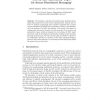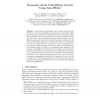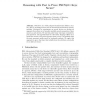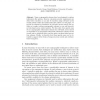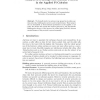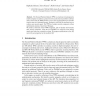122
Voted
IFIP
2010
Springer
14 years 9 months ago
2010
Springer
Abstract. We introduce a calculus with mobile names, distributed principals and primitives for secure remote communication, without any reference to explicit cryptography. The calc...
140
click to vote
IFIP
2010
Springer
14 years 9 months ago
2010
Springer
Abstract. Task-structured probabilistic input/output automata (taskPIOAs) are concurrent probabilistic automata that, among other things, have been used to provide a formal framewo...
IFIP
2010
Springer
14 years 9 months ago
2010
Springer
105
click to vote
IFIP
2010
Springer
14 years 9 months ago
2010
Springer
Service Oriented Computing (SOC) is a programming paradigm aiming at characterising Service Networks. Services are entities waiting for clients requests and they often result from ...
70
Voted
IFIP
2010
Springer
14 years 9 months ago
2010
Springer
103
Voted
IFIP
2010
Springer
14 years 9 months ago
2010
Springer
Abstract. This paper extends existing models for collaborative systems. We investigate how much damage can be done by insiders alone, without collusion with an outside adversary. I...
132
click to vote
IFIP
2010
Springer
14 years 9 months ago
2010
Springer
Many cryptographic schemes have been designed to enforce information flow policies. However, enterprise security requirements are often better encoded, or can only be encoded, usin...
120
click to vote
IFIP
2010
Springer
14 years 9 months ago
2010
Springer
Abstract. We formally study two privacy-type properties in online auction protocols, bidding-price-secrecy and receipt-freeness. These properties are formalised as observational eq...
122
click to vote
IFIP
2010
Springer
14 years 9 months ago
2010
Springer
The Trusted Platform Module (TPM) is a hardware chip designed to enable computers to achieve a greater level of security than is possible in software alone. To this end, the TPM pr...
108
click to vote
IFIP
2010
Springer
14 years 9 months ago
2010
Springer
We present a new approach to information flow control (IFC), ploits counterexample-guided abstraction refinement (CEGAR) technology. The CEGAR process is built on top of our existi...
